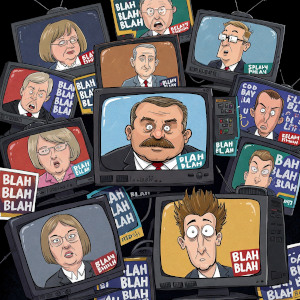About this site:
Let’s Break Out of the Distraction Trap
This site was started out of frustration over the lack of media attention to solutions for our broken government. There are literally millions of stories and web pages about government not responding to voters—about unchecked presidential power, corporate control of Congress and the Pentagon, a captured Supreme Court with no term limits. Lack of term limits for Congress, Congress making its own rules, party-controlled exclusionary primaries, gerrymandering, active voter suppression, the ridiculous amount of power over legislation held by just two people—the House speaker and Senate majority leader—and the list goes on.
The biggest obstacle to fixing this catastrophe may be that it seems so overwhelming. Many of us are ready to take action but don’t know where to start or where we’re going. Interviews, stories, and websites with basic, starter information are nearly invisible. How DO busy people supervise their reps in Congress? How can they network for more impact? What are some priority foundational issues to unify around right now to get traction and make a difference? What are the changes we want our candidates to commit to? The first steps and any coherent vision for the future are lost in the noise.
The drama of endless outrage is to be expected from corporate-controlled media, but why are so many others falling into the distraction trap?
We have to change the conversation to the solutions.

The idea of this site is to suggest a consensus platform to work toward, and a priority action agenda: a starting place for America’s frustrated voters, nonprofits, writers, strategists, commentators, and those representatives who are actually committed to legislating for their constituents, instead of just parking in the job like barnacles, enjoying the handouts and letting others make the decisions.
These suggestions were formed after many, many hours of digging into the sources of our many problems, foundational needs for a sustainable future, and the multilayered obstacles to reform. The site is heavy on links, because there are such excellent sources that have been studying and clearly and simply explaining, for a long time, the root causes of our complex problems and the myths that keep them going.
Ideas for the first legislative priorities to focus on to take back Congress were brought into focus in large part by Andrew Yang, who has zeroed in on how to return the democratic process to elections, especially primaries. Yang also has had the courage to imagine a post-AI economy. Understanding capitalism and oligarchy, and ideas for better ways of governing draw heavily from the work of Jason Hickel, Yanis Varoufakis, and Richard Wolff. As part of his enormous body of free online content, Dr. Wolff provides online talks on what socialism, communism, and Marxism are and are not. These are very useful, since capitalist teachings and media have utterly distorted and disparaged all economic systems that don’t feed the capitalist machine to the exclusion of all else.
Enormous undertakings like overturning Citizens United don’t fit into our suggested priority, “starter” actions because they require a Congress that works for voters, not for corporations. Citizens United is definitely appropriate to ask candidates about to see if they believe in responsive government, but our first order of business is easier to vote out the reps we don’t want, and vote in those responsive candidates. Oh yeah, and resist authoritarian rule.
We won’t get it done unless people with influence and expertise get together and change the conversation by zeroing in on priority actions, promoting big ideas, and rejecting the myths and fears that work against big ideas and against voter unity. A more united voting population can force reform of election law. And then…the universe!
We have to build attention and momentum for the solutions we need and the future we want. What good does it do to point fingers and rehash last century’s arguments? AI is taking jobs, the national wealth is being sucked into private accounts, and corporate media is doing its best to prop up the status quo. We have to make and guide our own media and conversation, and talk to those who don’t always agree with us. That’s how we find out how they got to their position and where the common ground is. Or so say those who figure stuff like this out. Real debate and public discourse helps good ideas proliferate and rise to the top. Good ideas resonate with good candidates and with voters, and will be shared, prioritized, promoted, and built on.
Happily, election reform starts at the accessible state level. MAJOR improvements are possible that will remove obstacles to electing people who will respond to voters and work for consensus solutions. This is the suggested priority agenda to work for in each state: national popular vote, open primaries, ranked-choice voting, and ending gerrymandering of electoral district boundaries. Once it’s easier to vote out incumbents who vote for corporate interests instead of us, fixing all the things we want fixed becomes much more doable.
So this suggested priority agenda has two parts: the state legislation part, and the media and personal/social networking part.
We have to think big and think fearlessly about the world we want. It’s changing fast, and it’s up to us to speak out for a world of peace, cooperation, and abundance. Nobody is hoping for an AI-driven world of endless international competition, exploitation, and war.
Note: This site includes copyright-free AI-generated images.
